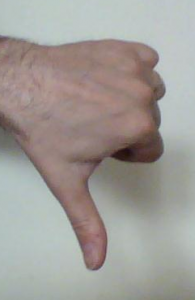This post’s title will make sense when you’re done reading the post. Rejection sounds like such a dismal subject, but it’s a fact of life for most writers. Nothing I can say here will make you enjoy getting rejections, but maybe my musings will offer a little perspective and a way to help you look at rejections differently.
 They say you learn more from failure than success. They also say that getting fired from a job is sometimes the best thing that happens to some people. Whoever they are, they seem awfully chipper about bad things happening to other people, don’t they?
They say you learn more from failure than success. They also say that getting fired from a job is sometimes the best thing that happens to some people. Whoever they are, they seem awfully chipper about bad things happening to other people, don’t they?
In my experience, the first rejection is the most difficult. Rejections get easier after that until they get routine. Just like the message that “they” are trying to convey with their little aphorisms, it’s all in your attitude, your reaction to the bad news.
Suppose you could speed past the first four Kübler-Ross Stages of Grief (Denial, Anger, Bargaining, and Depression) and reach Acceptance sooner. One way to do that is to realize the editor is not rejecting you. Remember, this is nothing personal. It’s just business. For whatever reason (and they don’t have to tell you the reason), your story was not a fit for them.
Remember, all you did was write the story. The publisher is the one who would have been taking all the financial risks. For some reason, your submission didn’t scratch the itch, didn’t yield a positive result in their profit/loss calculus. That’s all.
The other way to look at that rejection is to consider that it just gave you two freedoms. That’s right—your life now has two new options you didn’t have before:
1. First, and most obvious, you are now free to send that story to a different market. In fact, you should, and right away. Same day, if possible. Keep it moving. (Note: if two or more markets accept simultaneous submissions, then you might have already submitted your story elsewhere, in which case there’s no cause for great sorrow when one market rejects it.)
2. The second freedom is that you are now free to send a different story to the same market that just rejected the first one. Why not? They just rejected one of your stories, not you as an author. That last one didn’t meet their needs but the next story just might. (Again, if the market accepts multiple submissions, you might well have two or more stories being considered by them already, so one rejection isn’t cause for alarm.)
Lastly, take some solace in the fact that even some classic and best-selling fiction works were rejected multiple times before achieving acceptance and great success, including:
- Harry Potter and the Philosopher’s Stone by J.K. Rowling (1997). Rejected about 12 times by major publishers.
- A Time to Kill by John Grisham (1989). Rejected by 16 agents and 12 publishers.
- Lust for Life by Irving Stone (1934). Rejected by 16 publishers.
- The Diary of Anne Frank by Anne Frank (1947). Rejected 16 times.
- Dune by Frank Herbert (1965). Rejected 23 times by publishers.
- A Wrinkle In Time by Madeleine L’Engle (1962). Rejected 26 times by publishers.
- Carrie by Stephen King (1974). Rejected 30 times by publishers.
- Gone With the Wind by Margaret Mitchell (1936). Rejected 38 times.
Though it’s hard at first, be persistent in the face of rejections. Capitalize on the two freedoms given to you by each rejection. Keep submitting. That’s not only what they say, it’s also advocated by–
Poseidon’s Scribe

Hi Steve
I love your take on the “freedoms” garnered by rejection.
There’s a side benefit, I think, to being rejected and then sending your work out again: it keeps your story circulating and your name in front of many editors. Perhaps an editor didn’t want (note I didn’t say, that the editor didn’t ‘like’) this particular story, but he may recognize your name on the next story you send in and read it more favorably.
I tackle some of the many reasons why an editor didn’t accept your story over at my blog, in case you’re interested.
Thanks for stopping by, Kelly!
You’re right about the added benefit of keeping stories circulating, even to the same editors that rejected others. Thanks also for the link to your blog entry. It’s very informative and well written. I see yours already had a similar list of best-selling works that were rejected repeatedly. I wonder if I read it at the time, and some of the thoughts were still percolating around when I wrote mine? Either that or I never read it and great minds just think alike!